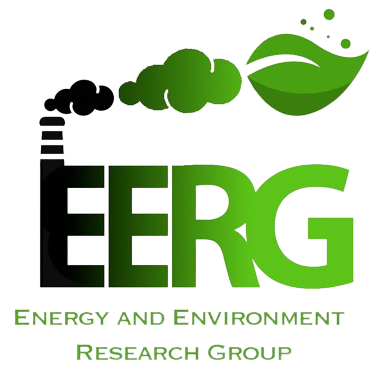EERG – ENERGY AND ENVIRONMENT RESEARCH GROUP
Areas / Focus
Carbon Capture
The EERG research group’s focus on Carbon Capture explores innovative technologies to reduce CO₂ emissions from industrial processes. The group develops and optimizes catalysts, solids, and solvent-based systems, including adsorption, and membrane technologies, to efficiently capture and store carbon. This work contributes to global efforts in mitigating climate change and advancing sustainable energy solutions.
Carbon Conversion and Utilization (CCU)
The EERG research group’s focus on Carbon Conversion and Utilization (CCU) explores innovative methods to transform captured CO₂ into valuable products. This includes advanced catalytic processes, electrochemical systems, and the tri-reforming process, which combines CO₂, steam, and methane to produce syngas. The group aims to convert emissions into fuels, chemicals, and materials, supporting a circular carbon economy and reducing environmental impact.
Hydrogen
The Energy Environment Research Group (EERG) specializes in hydrogen production through advanced reforming methods. Our research focuses on innovative technologies such as Dry Methane Reforming (DMR) and Tri-reforming of Methane (TRM), both of which utilize greenhouse gases like CO₂ to produce hydrogen efficiently. We are actively developing novel catalysts to enhance these processes, improving efficiency and reducing environmental impact. Our work also includes optimizing production pathways for sustainable hydrogen generation, contributing to cleaner industrial applications and supporting global decarbonization efforts.
Direct Air Capture (DAC) Technologies
The Energy Environment Research Group (EERG) is actively engaged in advancing Direct Air Capture (DAC) technologies to remove CO₂ directly from the atmosphere. Our research focuses on developing efficient materials and processes to capture and sequester CO₂, reducing greenhouse gas concentrations. By exploring innovative adsorption and chemical looping techniques, we aim to enhance the scalability and cost-effectiveness of DAC systems. EERG’s work in this area contributes to climate change mitigation by offering a viable solution for large-scale carbon removal.
Chemical Looping Technologies
The EERG research focus area, Chemical Looping Combustion (CLC), is dedicated to advancing energy efficiency and reducing emissions in industrial processes. By utilizing metal oxides as oxygen carriers, CLC technology enables efficient combustion with inherent carbon capture, contributing to cleaner energy production.
Modeling & Simulation, LCA, Machine Learning
The EERG research group’s focus on Modeling & Simulation, LCA, and Machine Learning is dedicated to advancing process design and optimization for carbon capture and utilization technologies. Utilizing tools like Aspen Plus, Aspen HYSYS, COMSOL, and MATLAB, the group conducts cutting-edge research to enhance simulation accuracy and lifecycle assessment (LCA) analysis. Machine learning and AI are integrated to refine models, predict outcomes, and accelerate technology development, meeting industrial scale-up requirements and staying at the forefront of technological advancements. This comprehensive approach ensures robust, scalable solutions for effective carbon management.
3D printing
The EERG research group’s focus on 3D Printing for carbon capture material development explores the use of additive manufacturing to create advanced, custom-designed materials for efficient carbon capture. This includes developing porous structures and tailored catalysts to enhance capture performance and durability. As 3D printing technology evolves, it holds significant potential for revolutionizing carbon capture solutions, offering precise material customization and rapid prototyping. The group’s research aims to position Canada and the global community at the forefront of this innovative field, driving advancements in sustainable carbon management and material science.
